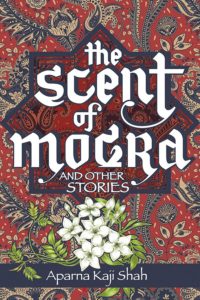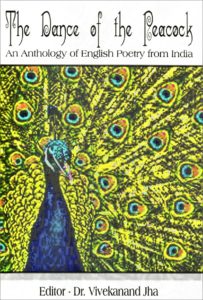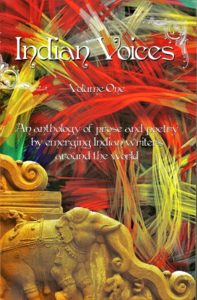The Scent of Mogra and Other Stories
The women of these tales are resilient and strong like the patron goddess of Mumbai, Mumbadevi. They don’t crumble under the weight of a male-dominated society but rise from the ashes of convention. They dare to be different, to bring meaning to their lives.
Here is an excerpt from the story, “Maya” where the protagonist is at an art gallery looking at a wall mural, and she meets a man, an artist:

Excerpt from “Maya”
Again, she gazed at the wall. She stepped back to get a better look, tucking her shoulder length brown hair behind her ears, so that it didn’t fall over her eyes. It’s a forest. The brown strokes are the tree trunks, the green leaves, thick and lush. The yellow struggling to be seen, like sunlight trying to shine through dense foliage. A dark gloomy forest, shrouded with mist in the early morning, the sun trying to penetrate the vegetation as the day progressed. What if she got lost in this jungle? How would she ever find her way back? She shivered, imagining dusk creeping up, and lengthening the shadows of the trees….
******
“Excuse me.” The man’s voice again. She whirled around to face him, and as she did so her dupatta slid down her shoulders and fell to the floor. They both bent down to pick it up. He got there first, and as they straightened up, their faces close to each other, they laughed. She embarrassed, he with delight, as he noticed the orange yellow of the fabric. When she stretched out her slim pale hand to take it from him, he grinned at her, and put the dupatta against his kurta, which she saw was a light yellow. He gave the dupatta to her. They stood there smiling at each other, and she imagined lying down with him on the forest floor.
Listen

The Dance of The Peacock
Aparna has published poetry in The Dance of the Peacock. It is an anthology of contemporary poetry by Indians, as well as diasporic Indians from all over the world, including the U.S, the U.K, and Canada, published by Hidden Brook Press in 2013. The Dance of the Peacock takes a comprehensive look at the global Indo-English poetry scene. Amongst the contributors are well-known names such as Menka Shivdasani, Priscila Uppal, and Arundhati Subramaniam.
Three of Aparna’s poems included in this collection are: Spring, The Sun Still Rises and Sets, and Self. These poems are different in their themes and styles. Spring is a prayer-like ode to the season; The Sun Still Rises and Sets is a dark poem about Nature’s indifference to human suffering; Self has a philosophical dimension, depicting the struggle between the fickle mind and the steadfast self.
Here is a stanza from The Sun Still Rises and Sets:
Excerpt from “The Sun Still Rises and Sets”
The earth is torn,
Trees felled, like mangled bodies, roots exposed.
Guts spill out of corpses;
Dead eyes gaze at the sky.
Walking skeletons with sunken cheeks
Point a blackened finger,
As dry as a charred twig,
At the mountain still erupting.
And the sun still rises and sets.
Listen
Indian Voices Volume One
“Ba”, Aparna’s first piece of fiction, was published in Indian Voices (Volume One). Indian Voices is a collection of prose and poetry by emerging Indian writers from many countries such as the U.S, Canada, Kenya, and Nigeria, and it was published in Mumbai in 2011. It was edited by Dr. Jasmine d’Costa from Toronto. Aparna has read the short story “Ba” to audiences in Mumbai and in Toronto where it was enthusiastically received. The story is a moving portrayal of a grandmother, and it is narrated by Ba’s grandson who is deeply affected by her. Below is a short excerpt; Ba, who is terminally ill, is returning home to Toronto after visiting India for the last time:

Excerpt from “Ba”
We waited outside the arrival gate, peering at the passengers as they went past. Just as we were thinking that perhaps she could not find her bags, an airline attendant walked up with Ba in a wheel-chair. My mother’s eyes widened, and my father put his arm around her shoulders. My hand flew to my mouth when I saw wrinkles and sagging flesh that I had not seen before. She seemed to have aged ten years in six weeks. With a wan smile and a far away look, she tried to get up from the wheel chair to get into the car. I quickly grabbed her arm, as she seemed to sway and wobble in front of me. She sat in the back seat with me and grasped my hand. We didn’t speak much.
******
After some months:
The next afternoon, the doctor said she was sinking. When my mother woke me up at four thirty in the morning, it was raining heavily after a night of lightening and thunder. I went in to see her, my parents by my side. She looked very gentle and peaceful. I stroked the back of her small hand, the one that had grasped mine when she returned from India. But now it felt cold, and her skin was more wrinkled, and finer than before.
By eight o’clock that morning, when friends had gathered at our home, and we took Ba to the crematorium, I was relieved that the rain had finally stopped. The sky was blue, and the sun was breaking through the clouds. The robins and cardinals seemed to have come to the yard to bid a final goodbye to Ba, and as we lowered the stretcher into the hearse, I thought I saw a slight smile at the corners of her mouth.
